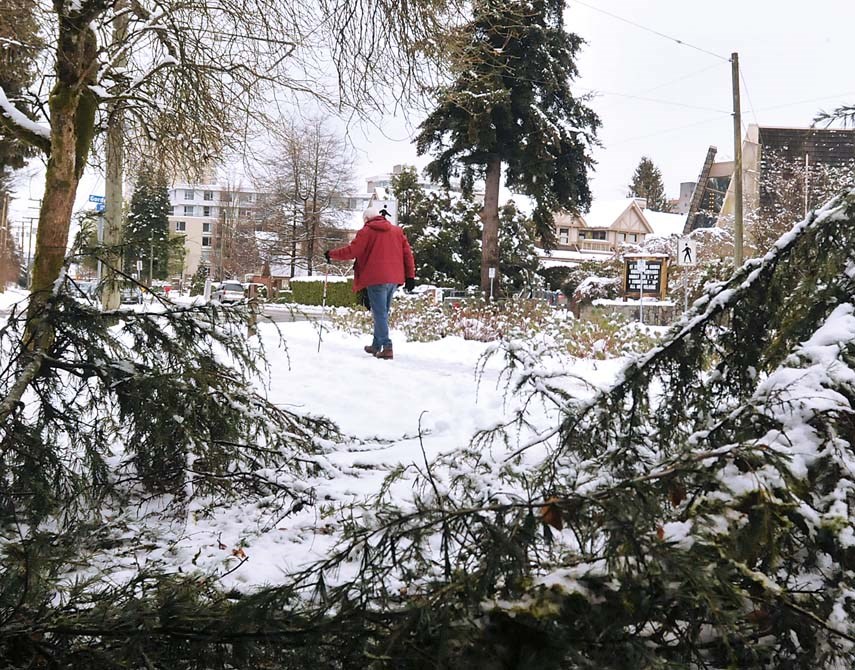It’s the time of year to winterize yourself.
Slipping and sliding may be OK on the dance floor, but don’t go skating on Lonsdale this winter.
North Vancouver is now in the thick of winter and seniors need to take the time to avoid risks at this time of year. Seniors can experience increased dangers of falling, increased risk of depression, isolation and other health related issues. These risk factors can adversely affect seniors because they affect their health, well-being and independence.
Seniors need to ask themselves if they are at risk and take stock of those risk factors. At this time of year, just as we winterize our houses and cars, we need to winterize ourselves.
Winter conditions in many parts of British Columbia can increase the likelihood of a fall, one of the most common causes of injury for seniors in British Columbia. In an article from a few years ago from the Vancouver-based Centre for Hip Health and Mobility, the organization stated that: “Last year, 319 B.C. seniors aged 65 and over experienced fall-related hospitalizations due to ice and snow. While we don’t experience the snowy conditions the rest of the province does, there can be plenty of icy conditions to be navigated safely on the North Shore.”
The article further goes on to state that: “According to Canadian Institute of Health Information data, over 70 per cent (of falls) occurred between January and March. This information is often referred to as the tip of the iceberg, as many more fall injuries are treated in clinics, emergency departments and doctors’ offices.”
Taking the appropriate action to prevent falls can help seniors stay independent and increase their overall health and well-being. So, how can you minimize the risk of falling this winter?
Some suggestions I’ve explored include wearing appropriate foot wear with good traction for those slippery conditions, dressing warmly so that your muscles stay relaxed, being careful getting out of your car, not taking shortcuts, taking extra time getting about, paying attention and not getting distracted while outdoors, keeping your driveway and walkways salted and clear, and staying active as strong muscles and bones are important in falls prevention. For strong bones it has been suggested that during the winter months, it is especially important to eat foods high in vitamin D and calcium and/or take supplements to get the recommended daily intake.
If conditions outside are difficult ask for help getting around. People are generally willing to assist when there are slippery conditions.
Along with falls, seniors can experience increased depression and possibly isolation at this time of year. On the North Shore we experience many days of dark, bleak and overcast weather which can cause even the most optimistic person to feel depressed.
Perhaps try these suggestions to minimize depression: keep active and try to maintain your exercise plan. If that includes exercising outdoors maybe take a daily walk in the middle of the day. Getting outside when it is light can help with your mood. Go around the block when it is not raining or, if the weather is too inclement, try an exercise regime that includes strengthening and balance exercises. Or you could try exercise programs at the nearest seniors centre. Also, eat healthy – this will help boost your mood, keep you on your diet and give you more energy.
A lack of social interaction during the winter months can lead to social isolation, loneliness, and related health issues, affecting overall mortality rates. Try to stay connected to friends and family to prevent isolation. Get out to a seniors centre or other activities. Have coffee with friends and family. If you are less mobile try chatting with friends on the phone or invite people over for afternoon tea or lunch. Take the opportunity to volunteer. Many community organizations are looking for help right now.
If getting around is difficult because you are reluctant to drive or walk, try alternate modes of transportation such as the Seniors Go Bus run by Silver Harbour Seniors’ Centre, the Seniors Hub Bus run by Capilano Services or the West Vancouver seniors’ shuttle buses.
Or perhaps take a taxi. Check with the organizations that host the bus services for times and location of pick up.
When the weather turns nasty, seniors who live alone may be at greater risk of getting poor nutrition. Seniors could consider getting food delivered by an online grocery service, or by an organization such as North Shore Meals on Wheels, which provides heathy, nutritious food and social contact.
Whatever the weather, prepare yourself for the season and don’t let winter get you down.
Margaret Coates is the co-ordinator of Lionsview Seniors’ Planning Society. She has lived on the North Shore for 48 years and has worked for and with seniors for 20 of those years. Ideas for future columns are welcome Email: lions_view@telus.net.



